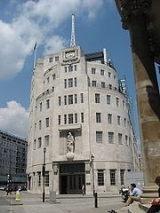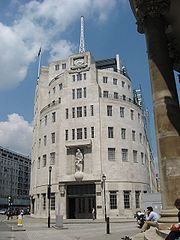
BBC General Forces Programme
Encyclopedia

BBC
The British Broadcasting Corporation is a British public service broadcaster. Its headquarters is at Broadcasting House in the City of Westminster, London. It is the largest broadcaster in the world, with about 23,000 staff...
radio station
Radio station
Radio broadcasting is a one-way wireless transmission over radio waves intended to reach a wide audience. Stations can be linked in radio networks to broadcast a common radio format, either in broadcast syndication or simulcast or both...
from 27 February 1944 until 31 December 1946.
Foundation
Upon the outbreak of World War IIWorld War II
World War II, or the Second World War , was a global conflict lasting from 1939 to 1945, involving most of the world's nations—including all of the great powers—eventually forming two opposing military alliances: the Allies and the Axis...
, the BBC closed the existing BBC National Programme
BBC National Programme
The BBC National Programme was a BBC radio station from the 1920s until the outbreak of World War II.-Foundation:When the BBC first began transmissions on 14 November 1922, the technology for both national coverage and joint programming between transmitters did not exist – transmitter powers were...
and BBC Regional Programme
BBC Regional Programme
The BBC Regional Programme was a UK radio network which operated from the end of the 1920s until the outbreak of World War II in 1939.-Foundation:...
, combining the two to form a single channel known as the BBC Home Service
BBC Home Service
The BBC Home Service was a British national radio station which broadcast from 1939 until 1967.-Development:Between the 1920s and the outbreak of The Second World War, the BBC had developed two nationwide radio services, the BBC National Programme and the BBC Regional Programme...
.
The former transmitters of the National Programme continued to broadcast the Home Service until 1940, when the lack of choice and lighter programming for people serving in the Armed Forces was noted. At that point, some frequencies were given to a new entertainment network, the BBC Forces Programme
BBC Forces Programme
The BBC Forces Programme was a BBC radio station which operated from 7 January 1940 until 26 February 1944.-Foundation:Upon the outbreak of World War II, the BBC closed the existing BBC National Programme and BBC Regional Programme, combining the two to form a single channel known as the BBC Home...
.
The BBC Forces Programme was replaced when the influx of American soldiers, used to a different style of entertainment programming, had to be catered for in the run up to D-Day
D-Day
D-Day is a term often used in military parlance to denote the day on which a combat attack or operation is to be initiated. "D-Day" often represents a variable, designating the day upon which some significant event will occur or has occurred; see Military designation of days and hours for similar...
. The replacement service was named the BBC General Forces Programme and was also broadcast on shortwave on the frequencies of the BBC Empire Service (itself reborn after the war as the BBC General Overseas Service and now known as the BBC World Service
BBC World Service
The BBC World Service is the world's largest international broadcaster, broadcasting in 27 languages to many parts of the world via analogue and digital shortwave, internet streaming and podcasting, satellite, FM and MW relays...
).
Programming
The BBC Forces Programme was launched to appeal directly to those members of the armed services during the Phony WarPhony War
The Phoney War was a phase early in World War II – in the months following Britain and France's declaration of war on Germany in September 1939 and preceding the Battle of France in May 1940 – that was marked by a lack of major military operations by the Western Allies against the German Reich...
who were mainly sat in barracks with little to do.
Its mixture of drama, comedy, popular music, features, quiz shows and variety was richer and more varied than the former National Programme, although it continued to supply lengthy news bulletins and informational programmes and talk.
However, when the American servicemen arrived en masse in 1943 and 1944 in preparation for Operation Overlord
Operation Overlord
Operation Overlord was the code name for the Battle of Normandy, the operation that launched the invasion of German-occupied western Europe during World War II by Allied forces. The operation commenced on 6 June 1944 with the Normandy landings...
, they found even the richer Forces Programme shows to be staid and slow compared with the existing output of the American networks.
In response to appeals from General Eisenhower, the BBC abolished the Forces Programme and established the General Forces Programme, designed to provide a mixture of programming suitable for American and British audiences and also to appeal to the "Home Front
Home front
Home front is the informal term commonly used to describe the civilian populace of the nation at war as an active support system of their military....
", who, research had shown, wished to listen to the same output as the forces once fighting had broken out.
As well as a large number of American network and Canadian Broadcasting Corporation
Canadian Broadcasting Corporation
The Canadian Broadcasting Corporation, commonly known as CBC and officially as CBC/Radio-Canada, is a Canadian crown corporation that serves as the national public radio and television broadcaster...
programmes, the General Forces Programme also offered British programming:
- Shipmates Ashore – for the Merchant Navy
- Navy Mixture
- Forces' Favourites – a record request show
- War Office Calling the Army – information and news for service people
- Strike A Home Note – for Scottish service people overseas
- Welsh Half Hour
- SEAC – a newsletter for the South East Asian theatre
- Hello GIs – a newsletter for Americans in Britain
- Mediterranean Merry Go RoundMerry-Go-Round (radio programme)Merry-Go-Round, also known as Mediterranean Merry-Go-Round and Middle East Merry-Go-Round, was a BBC comedy-variety radio show introduced as entertainment for British troops during World War II. It led to several spin-offs, such as Much-Binding-in-the-Marsh, Waterlogged Spa and Puffney Post Office...
– made up of Stand Easy for the Army, Much Binding in the Marsh for the RAF and HMS Waterlogged for the Navy.
Closure
After VE-DayVictory in Europe Day
Victory in Europe Day commemorates 8 May 1945 , the date when the World War II Allies formally accepted the unconditional surrender of the armed forces of Nazi Germany and the end of Adolf Hitler's Third Reich. The formal surrender of the occupying German forces in the Channel Islands was not...
, the British longwave frequencies of the General Forces Programme became the BBC Light Programme
BBC Light Programme
The Light Programme was a BBC radio station which broadcast mainstream light entertainment and music from 1945 until 1967, when it was rebranded as BBC Radio 2...
on 29 July 1945. The service continued broadcasting by shortwave to areas that were still seeing fighting, and after VJ-Day
Victory over Japan Day
Victory over Japan Day is a name chosen for the day on which the Surrender of Japan occurred, effectively ending World War II, and subsequent anniversaries of that event...
to occupying forces in each former occupied and enemy country.
As Britain began to disengage from each fighting area and civilian rule was restored and the soldiers demobbed, the reason for the existence of the General Forces Programme faded. In each area it was slowly replaced by the BBC General Overseas Service until complete closure on 31 December 1946.
Inheritance
The pre-war National Programme, whilst using the same frequencies and transmitters as the post-war Light Programme, was not the general entertainment network its successor the Light Programme became. The Light Programme was more of a child of the Forces and General Forces Programme, with a style of presentation and programming that had not existed in the United Kingdom before the war.Further reading
- Briggs, Asa History of Broadcasting in the United Kingdom Oxford:Oxford University Press 1995 ISBN 0-19-212930-9

